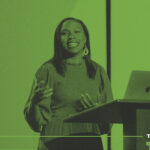What is your immediate response to the topic of race? I’m thinking it may not be, Man, I can’t wait to get on Twitter and talk about it. Maybe I’ll even consider bringing up critical race theory. This is going to be so much fun!
The topic of race relations is often fraught with pain and sorrow, confusion and debate. The struggle is understandable. Since the beginning of time, we’ve been at odds with one another. We can see ethnic strife throughout the world, and in the United States we have centuries of pain and injustice to overcome.
We don’t need to ignore this reality, but I think there’s room for another narrative and a different approach. We can celebrate our differences, learn to enjoy and love one another, and rest in the reality of what Jesus accomplished through his death and resurrection. And we can do this by becoming like a child.
We can celebrate our differences, learn to enjoy and love one another, and rest in the reality of what Jesus accomplished.
One of the first steps in returning to our childlike wonder is to begin taking the race conversation off the debate floor and putting it into our homes through study, adventure, creativity, and a little imagination. In my book Creative God, Colorful Us, I teach kids the truth of the Bible while helping them catch a vision for what that truth means.
Language
For example, when teaching kids about the imago Dei, we can help them understand through charts, games, or language patterns:
God is kind—you can be kind too.
God is loving—you can be loving too.
God is fair—you can be fair too.
God is forgiving—you can be forgiving too.
God is truthful—you can be truthful too.
God is wise—you can be wise too.
God is good—you can do good too.
These are simple prompts to help our children understand they are made to reflect the Lord’s goodness to the world.
Activities
Or you can create an activity:
Take a blank piece of paper (or a paper plate) and write “I’m made in the image of God” at the top. Then draw your face on the paper. You can color it or paint it and add yarn, cotton balls, or stickers. Be creative! In the space around your face, write words that describe the way God made you (funny, smart, curly hair, straight hair). Also, write words that describe what God wants us to be like so that we can reflect him (kind, fair, loving).
Around the kitchen table, you and your family can each answer this question: “What does it mean to be made in the image of God, and how do you see it in your (brother, sister, mother, friend)?”
Genesis 1 should be enough to make our hearts sing. But when we think of it like a child, doesn’t the reality that God would be mindful of us take your breath away? It’s a remarkable truth. You and I are created in the image of God. We have value and worth because God has given us value and worth. And God didn’t discriminate against certain people groups. Every person is made to reflect God. Now that’s something to celebrate!
When we think of it like a child, doesn’t the reality that God would be mindful of us take your breath away?
No, you haven’t talked about racism—you will. But now you have a good foundation. Your child is beginning to understand what it means to be made in the image of God.
Then, you can explain that sin against someone based on skin color is sin against a person made in God’s image. You can explain that their refugee neighbors are important because God has given them value and worth. You’ve set the foundation for the hard conversations by celebrating God’s good design.
Heart
Children learn sinful attitudes too.
One experience opened my eyes to the impressionable minds of children. While I was in a park with my family, a little girl approached me to say something she must have been trying to work out in her little head for some time.
She said, “You and your husband are wrong.”
“We’re wrong?” I asked in a perplexed way.
“Yes. You are not right. My mommy told me you are doing something bad. Black and white shouldn’t be together.” She was no more than 5 years old.
I’m in an interracial marriage, and this little girl freely repeated what her mother had said about us—we weren’t “right” because I’m black and my husband is white. As the mom walked over to retrieve her child, I informed her of what her girl said. I let her know that her daughter was helping us understand how she saw our marriage.
I prayed that the Lord would transform the mother’s heart. I wasn’t concerned about what she thought about my husband and me. I was concerned for her soul. I wished for her freedom. And I longed for her daughter to know good news—the good news. The mom was embarrassed—her racism had been revealed. She asked for forgiveness. I forgave.
I wasn’t concerned about what she thought about my husband and me.
The young girl saw the world as her mom was teaching her about it. But she had no idea that what she was saying to me was hurtful. There was a pep in her step, almost a cheerfulness. She was being a child.
We can do all of the fun activities, we can implement creative ways to learn about culture, but no level of creative activities will change the heart. We have to look in the mirror and ask the hard questions about what we truly believe about our neighbor and how what we believe is spilling out of us and onto our kids.
When we can be honest, we repent for what we’ve done wrong, and ask the Lord for forgiveness and grace. It’s at that point that we have true freedom to rejoice in all that the Lord has done.
This article is adapted from Creative God, Colorful Us (Moody, 2021).
Involved in Women’s Ministry? Add This to Your Discipleship Tool Kit.
 We need one another. Yet we don’t always know how to develop deep relationships to help us grow in the Christian life. Younger believers benefit from the guidance and wisdom of more mature saints as their faith deepens. But too often, potential mentors lack clarity and training on how to engage in discipling those they can influence.
We need one another. Yet we don’t always know how to develop deep relationships to help us grow in the Christian life. Younger believers benefit from the guidance and wisdom of more mature saints as their faith deepens. But too often, potential mentors lack clarity and training on how to engage in discipling those they can influence.
Whether you’re longing to find a spiritual mentor or hoping to serve as a guide for someone else, we have a FREE resource to encourage and equip you. In Growing Together: Taking Mentoring Beyond Small Talk and Prayer Requests, Melissa Kruger, TGC’s vice president of discipleship programming, offers encouraging lessons to guide conversations that promote spiritual growth in both the mentee and mentor.

































